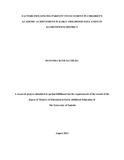| dc.description.abstract | The study sought to establish the factors that influence the parents’ involvement in early
childhood education in Kathonzweni district. The purpose of the study was to establish factors
that influence parents’ involvement in the children’s academic achievement in early childhood
education in Kathonzweni district. The study was set under the following research questions:
what is the influence of parents’ poverty level, marital status, literacy level and cultural beliefs
on their participation in their children’s academic achievement in early childhood education?
The data for this study was drawn from respondents through purposive, stratified and simple
random sampling procedures from the entire population of ECE centers in the district. The
samples included; Headteachers, pre-school teachers, parents and pre-school children. The
parents’ participation in early childhood education was used to assess the relationship between
the independent variable of poverty level, marital status, education level and cultural beliefs and
the explanatory (dependent) variable of academic achievement skills. The study was confined to
172 respondents who included: eight Head teachers, eight pre-school teachers, sixty parents and
ninety six pre-school children who were sampled through simple random, purposive and
stratified sampling procedures from twenty pre-schools. The research variables used in the study
included income (poverty level), literacy level, marital status and cultural beliefs. The results
obtained from the questionnaires, interview schedule and document analysis tools (instruments)
indicated that, majority of the parents do not fully take part in early childhood education. It is
evident from the findings that, the parents’ poverty level, literacy level, marital status and
cultural beliefs were significant in the way they participate in early childhood education. The
results of this study supported the factor that, parents in the highest social class did not fully
involve themselves in their children’s academic achievement as it was expected. In addition,
ECE centers started in areas with educated parents in urban centers did not perform well
academically, compared to those in rural areas. The cultural beliefs of the parents affected most
of the rural areas than the urban ECE centers. The private pre-schools were better than the
public pre-schools in learning facilities and academic achievement. There were also marital
differences in participation of parents in the early childhood education, with the married women
parents showing more concern than the married males. The main policy implication of this study
includes the empowerment of women through formal education and of the rural parents, which
are critically important in the promotion of children’s academic achievement. There is also need
to initiate school feeding programmes and pre-school income generating projects, which will
enable the parents to participate fully in their children’s academic achievement.
The study concluded that the MOEST should improve funding system in ECE and also shed light
to policy makers to formulate appropriate ECE policies and changes. | en |

